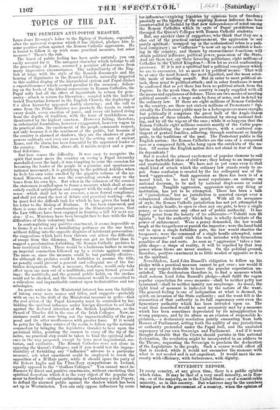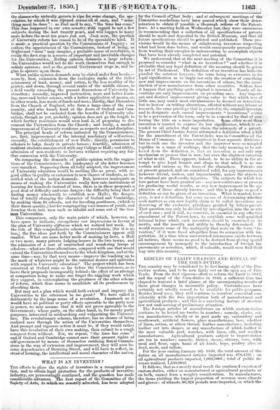UNIVERSITY REFORM.
Ix every country, at any given time, there is a public opinion which rules. It may be that of a very small minority, as in Rus- sia ; or of the majority, as in the United States ; or of a considerable minority, as in this country. But whatever may be the numbers taking part in the government a a country, when the opinion el the falasses who virtually, govern. is ripe for:some change, the spe- culatMn by which it was ripened ceases all at once, and " some- tiling must be done " : as Peel used to say, " the time has come." Thieithas happened in our -own oeuntry with regard to not a few
subjects, during the last typist? years, and willhappen to many
moresbefore the next-ten years, run out. , Just •now,. the question of tbleiversity reform has °eased to be of the speculatsvelind. It is made a practiCal question by the Commissions,Of Inquiry ; or rather the appointment of. the Commissions, instead of being, as frittlst;ned dons may imagine, a probable cause of revolution, is redVehe,ff est step in a coursepf important and inevitable changes foe stigetsivereities.. Ruling opinion demands a large reform : thsellfsiversities would not de the work themselves fast enough to satisfy opinietts and so the-general, Geviernment steps in, and be- gitit, to operate:upon them, What public, opinion demands may be stated under four heads,—
namely, first, extension. from the exclusive ranks of the richer aristocracy of land, money, and cotton, to the less wealthy of the gentry, and down, through several ranks of the middle classes, to a field vastly exceeding the present dimensions of University in- struction ; secondly, improved inetruction, more and better learn- ing, more and better science, with a better epplication of means, or, mother words, less waste of funds and men; thirdly, that Dissenters from the Church of England, who form a large class of the com- munity, and who knock hard at the doors of Oxford and Cam- bridge, shall not be excluded from the benefits of University edu- cation, though as yet, probably, opinion does not go the length to which further resistance would soon lead it, of proposing to dis- connect the Universities from the Church ; and lastly, a marked improvement of University residence asrespects cost and discipline. The principal heads of reform indicated by the Commissioners, are, first, improvement of the internal machinery of self-action; secondly, the establishment of new Halls ; thirdly, permission to scholars to lodge freely in private houses; fourthly, admission of resident students unconnected with any College or Hall ;. and fifthly, admission of non-residents to lectures without requiring any fur- ther connexion with the University. On comparing the demands of public opinion with the sugges- tions of the Commissioners, the inadequacy of the latter becomes verymanifest. Supposingthem all fully adopted, the improvement of University education would be nothing like as great, with re- gard either to quelity or extension to new classes of students, as the settled wish of the nation deniands. Buts however inadequate as means of making the TJniversities really first-rate institutions ad learning for hundreds instead of tens, there.is in these proposals a good deal of difficulty anclecmie danger ; the difficulty being that of money wherewith to establish new Halls; the danger,
that o totally changing the character of Oxford acrd Cambridge, by making them fit schools, not for breeding-yes-saes/ten, (which is their finest qualitv,) but for congregating vast masses of youth, and forming them into men such as inhabit and come out of the Ger- man Universities.
This comparison, only the main points of which, however, we
have space to indicate, strengthens our impressions in favour of the-plan of University diffusion which we noticed last week. By the side of this comprehensive scheme of revolution, (for it is no less,) the five ideas put forth by the Commissioners appear still smaller. What are some better mode of makieg by-laws, a Troll or two more, many private lodging-houses in the. wo towns, and the admission of a sort of unattached and wandering troops of scholars—what are these alterations, compared,with one that would extend the Universities themselves to the whole kingdom, and at the wanetime—nay, by that very means—improve the teaching up to the mark of •whatever might be the national desires and aptitudes with regard to University education? The projectwhioh has been conceived at Oxford runs so far before -the Commissioners, as to leave their proposals incomparably behind ; the effect of an attempt at comparison being . to make one forget the niggling work which they suggest, in contemplating the greatness of the other scheme of reform, which thus seems to annihilate all its predecessors by absorbing them.
Dut may not a plan which would both extend and .improve the
Universities to the uttermost be too great? We have called it deliberately by the large name of a revolution. Inasmuch as it would have no political or party effects agreeable to the party now in power, we may assume that it will not prove agreeable to the Government; whose party, on the other hand, is, formerely party
i
purposes, interested in unchurchieg and vulgarizing the Universi- ties. The revolutionary scheme, thei4one, has no chance of being realized save through the action of the Universities themselves. And.prempt and vigorous action it must- be, if they would rather have this revolution of their own making, than submit to a rough conquest from without. For, we repeat, "the time has come anfLif Oxford and Cambridge cannot save their present rights of self-government by means of themselves outdoing Royal Commis- Sian in the way. of extension and-improvement, they will soon .be- come dependencies of Downing Street, and will have to reflect, in- stendof forming, the intellectual and moral &sinister of the nation.

























 Previous page
Previous page